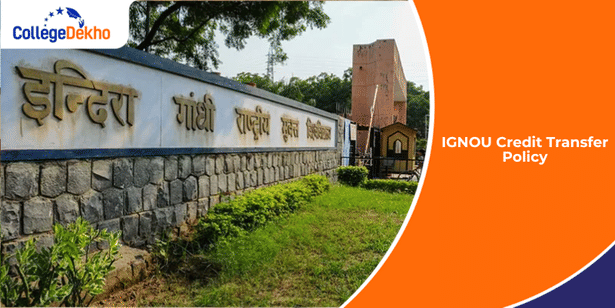
The IGNOU Credit Transfer Policy 2026 is the updated/ modified version of the credit transfer scheme at IGNOU, which allows students to transfer their earned credits to another program through a systematic process, once they have fulfilled the requirements for courses at IGNOU or another recognized institution. In essence, this means that they can continue their academic pursuits without having to review previously finished work, which is beneficial for both undergraduate and graduate courses. If you wish to take advantage of this scheme, you must know the rules and regulations for the same.
Also Read:
| IGNOU Courses 2026 |
|---|
IGNOU Credit Transfer Scheme Major Highlights 2026
Before we dive into the detailed modifications and changes introduced to the IGNOU Credit Transfer Scheme, let's check the major highlights for the same in the table below:
Particulars | Details |
|---|---|
Applicable To | Students who have studied in other universities/ institutions and wish to join IGNOU |
Documents Required |
|
Eligibility |
|
Exclusions |
|
Fees | Prescribed Credit Transfer fee per course (varies by program) |
Maximum Credit Transfer Allowed | Up to 50% of the total credits of the IGNOU program (varies by program) |
Minimum IGNOU Study Requirement | The student must earn at least 50% of the total credits directly from IGNOU |
Outcome | After approval, exempted courses will appear as “Transferred Credits” in the IGNOU grade card/transcript |
Process |
|
Scheme Name | Credit Transfer Scheme |
Types of Credit Transfer |
|
Modified IGNOU Credit Transfer Policy 2025
Until any altered IGNOU Credit Transfer 2026 rules are out, you can check out the modified IGNOU credit transfer policy 2025 with new changes mentioned in the table below:
Feature / Aspect | Earlier (Pre-2025) Policy | Modified Policy 2025 — Key Changes / Clarifications |
|---|---|---|
Authority / Approval | Various notifications and internal rules | Unified via the Academic Council’s 83rd meeting (18 Feb 2025); supersedes earlier notifications |
Applicability | Differing treatment program to program; older rules for internal & external transfer | Applies uniformly to all programs across IGNOU |
Program completion requirement | Credit transfer for incomplete programs; some ambiguity | Credit transfer is allowed only for courses of an incomplete program. If a program is already completed and a degree/diploma awarded, no transfer allowed. |
Shelf-life (validity) of credits | In many older cases, validity periods were implicit or shorter | Credits (for both internal and external transfer) must be no older than 7 years from the date of earning |
Maximum external credit transfer allowed | Often up to 50% in many programs | Up to 50% of the total credits of the target program may be transferred externally (subject to equivalence) |
Internal credit transfer (within IGNOU, changing enrolment) | Allowed under certain rules, mapping of old vs new courses | Continues, but with clear mapping rules: if course codes changed, there must be a defined mapping. Internal transfer is allowed only before the expiry of the new enrolment validity. |
Early completion / minimum duration constraint | Students often had to observe a minimum duration, even after transfers | After credit transfer, students will be allowed to complete the program in the minimum possible time (semester/ year as applicable), without having to wait to complete the minimum duration if all requirements are met. |
Change of courses/ electives | Some prior flexibility, but less formalized | Students seeking credit transfer may also apply for a change of course(s) (electives) to align with their transferred credits and to facilitate early completion. |
Fee/cost of credit transfer/ change of course | The earlier system had per-course fees (varying) | No fee per se for credit transfer or course change, but a **one-time non-refundable processing fee is to be charged: • Up to 16 credits → INR 500 • More than 16 credits → INR 1,000 |
Exception / special mapping (e.g., ICAI) | ICAI courses were not fully mapped under the older policy frameworks | Under the new policy, IGNOU allows credit transfer/exemption for ICAI courses (mapped to certain IGNOU BCom / MCom programs). Conditions: allowed only once; transferred credits' validity capped at 7 years |
Programs exempt / restrictions | Some restrictions on research / practical / project / dissertation courses | Practical / project/dissertation components are generally not eligible for credit transfer if curriculum mismatch. Also, transfer is not allowed for completed programs. |
Implementation / effective date | Older notifications in force until updated | The modified policy is in force with immediate effect as of the notification (May 2025) and applies to all programs henceforth. |
We hope this article was informative and helpful. Check the links mentioned below to learn more!
Related Articles:
If you have further queries regarding the IGNOU Credit Transfer Scheme, you can write to hello@collegedekho.com or call our toll-free number 18005729877. You can also fill out our Common Application Form on the website.
Are you feeling lost and unsure about what career path to take after completing 12th standard?
Say goodbye to confusion and hello to a bright future!

FAQs
Yes, IGNOU Credit Transfer applies to online courses if they’re UGC-recognized, equivalent in content and credit value, and completed within the 7-year validity under the Modified Policy 2025.
To apply for IGNOU Credit Transfer, visit your Regional Centre, fill the Credit Transfer Form, attach transcripts, equivalence proof, pay processing fees, and submit for verification.
Yes, you can use the IGNOU Credit Transfer Scheme for the MBA programme, subject to equivalence, credit limits, and approval under the Modified Policy 2025.
The IGNOU Credit Transfer Scheme was introduced in 2010 to help students transfer credits from previous studies or universities, later updated under the Modified Policy 2025.
Admission to IGNOU takes place in two cycles, in January and July. While the January session registration period typically ends in March, Indira Gandhi National Open University (IGNOU) admissions for the July session begin in June and run through July-August. Admissions are primarily determined by the sum of the candidates' previous qualifying degrees. Admission to the July batch is available to students who were not accepted into the January batch. Therefore, the answer is nearly yes.
Was this article helpful?





















Similar Articles
27th WB SET OBC-B Category Expected Cutoff 2025 for All Subjects
27th WB SET Political Science Cutoff 2025: Check expected cutoff, previous years' cutoff trends
27th WB SET OBC-A Category Expected Cutoff 2025 for All Subjects
27th WB SET History Cutoff 2025: Check expected cutoff, previous years' cutoff trends
27th WB SET ST Category Expected Cutoff 2025 for All Subjects
27th WB SET Economics Cutoff 2025: Check expected cutoff, previous years' cutoff trends